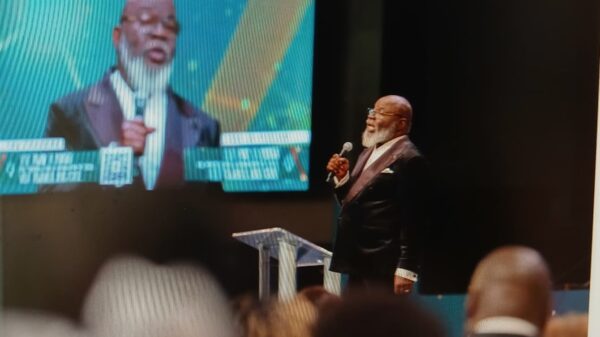By Kelli Smith
Candice Higginbotham and Megan Williams believe they failed Tony Timpa’s family.
The two women were on the eight-person jury that awarded $1 million Wednesday to Timpa’s 15-year-old son in the civil trial against four Dallas police officers accused in his death. Timpa’s parents and his estate weren’t awarded anything.
“As soon as he read the verdict, I wanted to cry,” said Higginbotham, 31, a patient representative at UT Southwestern Medical Center from Dallas. “It just did not sit well with me from the get-go, and I felt like I should have done more.”
During a news conference Sunday at the Uptown law office of one of the attorneys representing Timpa’s family, Higginbotham and Williams said they fought with the other members of the jury during about 6.5 hours of tense deliberations. The verdict was a surprise to the attorneys for Timpa’s family, who had asked for between $40 million to more than $300 million.
The jury’s decision came after seven days of testimony in the civil trial against Dallas police Officers Dustin Dillard, Raymond Dominguez, Danny Vasquez and Kevin Mansell. Dillard was accused of excessive force for kneeling on Timpa’s back for about 14 minutes after the 32-year-old called 911 for help during a mental health crisis Aug. 10, 2016. Dominguez, Vasquez and Mansell were accused of failing to intervene.
Body-camera footage shows Timpa was handcuffed behind his back and pinned facedown by officers as he yelled for help. When he became unresponsive, officers joked about waking him up for school. He died within about 20 minutes of the officers’ arrival.
/cloudfront-us-east-1.images.arcpublishing.com/dmn/3WGY3WIOOJC45NVIPQBZ72426M.jpg)
An autopsy ruled Timpa’s death a homicide caused by sudden cardiac death due to “the toxic effects of cocaine and the stress associated with physical restraint.” The Timpas’ attorneys said Timpa died of positional asphyxia — when people can’t breathe because of their position. The police officers’ attorneys pointed to the autopsy report and argued Timpa’s “secret life” of substance abuse, mental illness and heart conditions contributed to his death.
The jury determined Dillard, Dominguez and Vasquez violated Timpa’s constitutional rights, but said Dillard and Vasquez were protected by qualified immunity, a controversial legal shield that can protect officials, like police officers, from lawsuits.
Williams, 32, and Higginbotham are the first two jurors to publicly speak out about the decision the panel made. They told reporters on Sunday that the jury thought the officers would have to pay whatever money was awarded out of pocket, which swayed their decision.
Geoff Henley, who represents Timpa’s mother and son, told reporters Thursday that the city of Dallas indemnifies officers, meaning they’re exempt from paying for actual damages themselves. The city pays through insurance.He said it’s not admissible, however, to tell a jury that during trial.
Other jurors contacted by The Dallas Morning News in recent days did not respond or declined to comment.
“We were in the room with those jurors, and we know that they know those cops did wrong,” Williams said. “They were just worried where that money was going to come from. They were worried about those police livelihoods when those police weren’t worried about Tony’s.”
If they could go back, both women said they would have fought harder for Timpa’s loved ones.
“I would have given them everything they asked for,” Higginbotham said.
Heated back-and-forth
Williams, who is from Joshua in Johnson County, said she read about the case after the verdict and found out the city of Dallas didn’t release the body-camera footage of Timpa’s death for three years.
She also found out that U.S. District Judge David Godbey initially ruled the officers were shielded by qualified immunity, which was later reversed by the 5th U.S. Circuit Court of Appeals. The appeals court cited several decisions it said supported the Timpa family’s right to sue and showed the facts were serious enough to be examined by a jury.
Those points weren’t discussed during the trial, which started Sept. 18.
/cloudfront-us-east-1.images.arcpublishing.com/dmn/NISN7LYENZCZNBJIHDGZVVGOZI.jpg)
“Those things just made me feel like all along this is something that has been trying to be covered up,” said Williams, who works in finance. “I just felt like I had to reach out to somebody.”
Even though the jury found Dillard violated the Fourth Amendment, qualified immunity applied because they found a reasonable officer would not have known the restraint he used was unlawful. The doctrine came under intense fire after a Minneapolis police officer murdered George Floyd in 2020.
During the trial, Williams said, she thought about Floyd’s murder and how America seemed to concludeyou don’t kneel on people. Dillard knelt on Timpa’s back, not his neck, but he used his knee on Timpa for about five minutes longer than the officer who murdered Floyd, she noted. She said she thought everyone would be on the same page when they entered the deliberation room.
“It was not until I was in that room deliberating and started hearing the opinions of some of my fellow jurors that I was like, ‘What is happening right now?’”Williams said.
Williams and Higginbotham said all jurors agreed Dillard violated Timpa’s constitutional rights. They also agreed Mansell, the highest-ranking officer present the night Timpa died, was the least responsible because he wasn’t therefor much of the time Dillard was on Timpa’s back.
Mansell retired a few years after Timpa’s death. The other three officers remain on the force.
Higginbotham and Williams said they believed Vasquez and Dominguez also violated Timpa’s rights, but other jurors disagreed. They said they argued and, after a back-and-forth, the panel agreed with them so that they could move on to the next question — which was about qualified immunity, Higginbotham said.
“They wanted to give them all immunity,” Higginbotham said. “And I couldn’t.”
Williams said jurors who disagreed with both of them were “huffing, putting their heads down on the table,” and would say things like, “What are we going to do, are we going to read this again?”
“They wanted to wrap it up quickly,” Higginbotham said. “They were talking about going back to work and having a doctor’s appointment the next day. And to me, that didn’t matter, and it just felt like they were just wanting to get it over with.”
Only “a couple” were “willing to pull out evidence” and debate with Williams and Higginbotham about why the officers should be afforded qualified immunity, Williams said.
“They thought the cops would have to pay the money,” Williams said. “And they thought that the EMTs should be held accountable. Which we’re not saying is wrong about the EMTs, but that’s not what we were there for.”
During their testimony, each of the officers shifted attention to the paramedics present as police restrained Timpa. The officers said the paramedics, Curtis Burnley and James Flores, were in charge of the medical situation. Neither paramedic testified. They were both placed on two-year probation after Texas’ Department of State Health Services in 2021 found that they failed to intervene as Timpa became unresponsive. The state said they also falsified Timpa’s patient care report.
Williams said some jurors also opined that if the criminal case was closed and the officers weren’t found at fault, then “how can we find them at fault?”
Dillard, Mansell and Vasquez were indicted in 2017 on criminal charges of misdemeanor deadly conduct, but Dallas County District Attorney John Creuzot said he dismissed the case after three medical examiners would not testify that the officers acted recklessly.
Final decisions
Williams said the jury finally determined Dominguez was the only officer not shielded by qualified immunity because he was the second-highest ranking officer present the night Timpa died, and during the trial, the jury learned that Dominguez had previously faced an internal allegation related to giving a false report. The details of that allegation were unclear.
Higginbotham said she tried to suggest an award of $14 million, to represent the 14 minutes that Dillard knelt on Timpa’s back, but the jurors disagreed. She tried to suggest $3 million, to represent the three minutes Dillard continued to kneel on Timpa’s back even after he died, according to medical experts.
The jurors still said it was too much, she said.
“I said, ‘I’m not going no lower than a million,’ and then that’s when everybody jumped on it,” Higginbotham said.
“They said money wasn’t going to bring him back,” she added. “I said, ‘I understand that. It’s not about bringing him back. It’s about compensating for the mental anguish and the fact that he’s not going to be here no more. The son’s not going to have him there for graduation and just other life events.’”
Williams said they initially saw it as a victory that they convinced the other jurors not to grant Dominguez immunity so they could award the family money. They were happy to put out there “that Tony’s rights were violated.” But after she and Higginbotham have reflected in the days since the verdict, they said they realized “we could have done more.”
Williams said “it was terrifying” to hear testimony from a Dallas police trainer that the department still uses the prone restraint when someone is restrained face down. She said she hopes the jury’s unanimous decision that Dillard violated Timpa’s rights sends a message to Dallas police.
“The fact that we were able to all agree on that Tony Timpa’s rights were violated meant a lot to me,” Williams said. “We’re hopeful that the Dallas Police Department will look at that and hold their officers accountable.”
Williams said if they hadn’t argued back, the other jurors likely would’ve come to a decision much sooner, granted all of the officers qualified immunity and given Timpa’s family “nothing.”
/cloudfront-us-east-1.images.arcpublishing.com/dmn/QCZOODTYMJCPBN5B26TR4VVJAQ.jpg)
“I never would have imagined it taking a toll on me like it has,” Williams said. “It is absolutely crazy, and it’s intense. It’s hard to even know what I could have done different, but I agree with [Higginbotham], and I apologize to the Timpa family as well.”
She said she believes Dillard, Vasquez and Dominguez should’ve been held more accountable, adding she’s troubled by how “you can kill a man, and go to work the next day.” She said she’s also thought of her own 15-year-old son, who she said is bipolar.
“It’s been heavy on my mind, the outcome,” Williams said. “As a resident of Johnson County, it makes me not want to go to Dallas County, honestly, to know that they still work there.”
Williams said she backed down in the jury room eventually because she was overwhelmed, but Higginbotham never wavered. Williams said she was “shaking” after the verdict was announced.
After they left the courtroom, she walked over to Higginbotham and asked to give her a hug.
“I just felt like that was because I couldn’t hug the Timpas,” Williams said. “And she was their voice in that room.”
This story, originally published in The Dallas Morning News, is reprinted as part of a collaborative partnership between The Dallas Morning News and Texas Metro News. The partnership seeks to boost coverage of Dallas’ communities of color, particularly in southern Dallas.









You must be logged in to post a comment Login